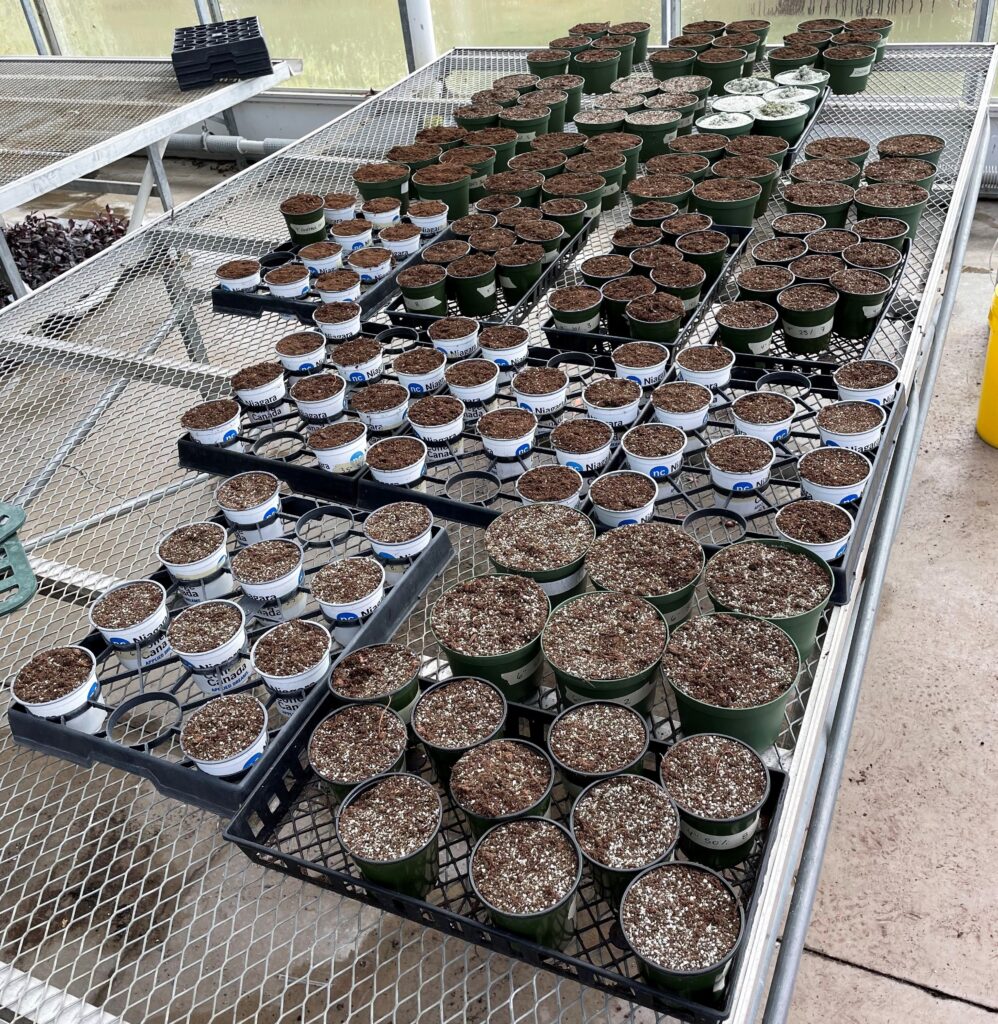
Challenge: Understand if the weight of a new soil amendment will impact shipping and handling of plants Solution: Developed multiple blend ratios of growing media and evaluated the dry and wet weights of potted plants Impact: Support commercialization of greenhouse-related technologies, impacts on growing and supply chains must be considered
Zeolite is a naturally occurring mineral, known for its unique chemical and physical properties, which is used in several industries and applications. In horticulture, zeolite can be used within growing media in the form of raw granules or granules embedded with plant nutrients. Zeolite has the potential to be blended with peat moss to create a novel growing media with the necessary physical characteristics for ideal plant growth.
However, zeolite is a rock mineral which, depending on its concentration in a growing media, could increase the total weight of plants potted in zeolite-containing blends. Increased weight of media has the potential to impact the packaging and shipping of potted plant material, thus requiring a more comprehensive study to understand the extent to which zeolite may impact shipping.
The overall goal of the project was to establish dry and wet weight estimates on various zeolite-peat moss media blends in a range of growing pot sizes, to assess the potential impact on shipping and handling of plants.
Niagara College’s Horticultural & Environmental Sciences Innovation Centre (HESIC) team created multiple zeolite-peat moss blend ratios and determined dry and wet weights of plants potted in several different pots with zeolite-containing media.
Through this study, it was confirmed that an increase of the zeolite content in media increases the overall weight of the media when both dry and wet. When used to fill six-inch container pots, zeolite blended with peat moss at a rate of 25% remained well under the manual heavy lifting boundary set within Ontario Occupational Health and Safety Act (OSHA).
In addition, the study indicated that the inclusion of zeolite in a peat moss-based growing media doesn’t cause the weight of the media blend to be over-weight, according to both manual handling according to health and safety practices; and to road limitations of a single-axle truck in Ontario, Canada.
Zeolite blended up to a ratio of 1:1 zeolite to peat moss (i.e. 50% zeolite, 50% peat moss) did not cause a full tray of pots to exceed the safe (health and safety workplace standard) lifting limit of 22.5 kg (50 lbs.). The maximum load a single-axle truck on Ontario roads is approximately 8,000 kilograms. When fully loaded with racks of plants in zeolite-containing peat moss media in six-pots, it is estimated that a single truck will weigh well below this limit.
As well, the blending of zeolite with peat moss increases the weight of the media at a predictable rate, whether the media is wet or dry. It is feasible to expect, from these results, that including zeolite within a peat moss-based growing media will not cause difficulties in manual handling based on increased weight of the media. There is, however, the potential that the increase in weight of a loaded truck due to zeolite will increase fuel consumption and mechanical maintenance. This possible increase in shipping costs is an important consideration when modelling a business plan.
It has also been found through this study, that a single-axle truck used to transport a full load of potted greenhouse plants grown in 25% zeolite blended media will not exceed the road limitations set by the Ministry of Transportation of Ontario (MTO).
This is an important consideration when evaluating commercialization strategy is the likelihood that use of zeolite in growing media will increase the cost of shipping and transportation as weight of the potted product increases.
International Zeolite Corp. and Niagara College’s Horticultural & Environmental Sciences Innovation Centre (HESIC) have an ongoing agreement in place that provides priority and support for research projects in relationship to IZ’s proprietary grow system NEREA®, which will be carried out by HESIC.
This project is funded by the Government of Canada through the Federal Economic Development Agency for Southern Ontario.
Visit Niagara College’s Horticultural & Environmental Sciences Innovation Centre page to learn more about its resources and capabilities.






